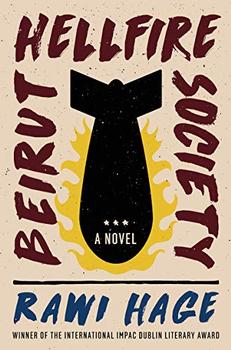Page 3 of 4
There are currently 26 member reviews
for Beirut Hellfire Society
-
Robert M. (Smyrna, GA)
Dancing With Death
This is the first novel I have read by Rawi Hage, and I thought it was a well-written, thoughtful work. The cleansing element of fire and the largely disrespected work of the undertaker are examined in the violent world of Lebanon during their civil war. Hage's vision reads like mythology, with all of the requisite symbolism and allegory. It is an original work that reads at times like poetry and other times like a memoir, with all of the emotion and pain indicative of both art forms. Plot is more the passenger than the vehicle for this novel, and because of this, many readers may not embrace Hage's vision. However, if the reader gives in to the language and the experiences presented by the protagonist, Pavlov, this novel will yield a rewarding vision.
-
Susan U. (Brookfield, WI)
War in Beirut
Worn torn Beirut during the civil war of the 1970s is the setting for the book and the author makes very clear that is was a vicious place to live. People were deprived, depraved, humanity got lost, those that lived on the fringes were frightened, abused and murdered. The book is dark with a warped sense of humor. It's a disturbing book but the prose kept me reading. I felt it was an important book to read because it made the impact of war very real and given the state of the world, I think we all need to understand what war does to lives. This description of a young woman wondering aimlessly provides good insight into the life of this book. "She sat on the ground, covered in blood. She had lost her entire family, she told him. She screamed then laughed and then she lost her mind". The prose and the author's style make me want to read more books by Rami Hage.
-
Paula B. (Albuquerque, NM)
War is hell and a rough read
Life in the midst of war is harsh and everything but war becomes irrelevant to daily life. This is the topic of Beirut Hellfire Society. The utter profanity of war, the desperation of the occupants of a city at war and the irrelevance of even the traditions of death are reflected in the activities of the characters in this book. War allows no joy, no warmth and eventually no humanity. Absence of all but war creates a stark commentary on the realities of war, unadorned by heroism, compassion or triumph in any aspect of life. Our society glorifies war, especially as part of the past, this book does not. Human desperation and efforts to confront daily violence and an unknown future are bravely attacked by the main character. The darkness in this book means it will appeal to a select group of sophisticated readers, not every reader. The book reminds me of a line from a Ferlinghetti poem - "and then came the smiling mortician."
-
Jan Z. (Jefferson, SD)
Beirut Hellfire Society
This was such a strange book - the 1st I've ever read by Rawi Hage. Reading reviews of his others makes me think all of his books are of the same sort of strangeness. You will probably LOVE them or HATE them...(I'm closer to the hate side.)
The setting was placed in Beirut during the civil war. The main character was Pavlov who was the son of an undertaker killed in a bombing raid. There wasn't much of a plot - basically each chapter was the story of a different person or, in some cases, two people, in one case a dog, who Pavlov knew. There was some interconnection between the people but not enough to enhance or describe much character development.
Pavlov was a reader of the Greek classics and somewhat of a philosophical person so much of the book was his musings on different topics - quite often death and all the things related to death.
The only reason I read the entire book was because every now and then there was a gem of a phrase, metaphor, description or thought, especially in the beginning that, in my opinion, made it worthwhile.
-
Jenn W
Beirut Hellfire Society
This was a difficult book to read. The writing is beautiful with amazing descriptions of war and life in a war torn city. However, I could not connect to any of the characters in the story. They were described well, but each person in the story seemed to hold others at bay, guarded and walled off, even to the reader.
The story showed how war is sometimes secondary to the violence in families and society as a whole. War and violence loom over everyone and everything and the only option is to endure as long as possible.
-
Peggy T. (Richardson, TX)
Beirut Hellfire Society
Beautifully written but sad, depressing, nihilistic. I guess all of that is to be expected in a war-torn city at a time when anyone's life could be ended at any moment. I am glad I read it but I did not enjoy it.
-
Beverly D. (Palm Harbor, FL)
Not my cup of tea...
I wanted to like this book...guess I just wasn't ready for the author's loquacious/ outrageous style and his very dark humour. I found the subject matter interesting enough but could not hook into the story....
